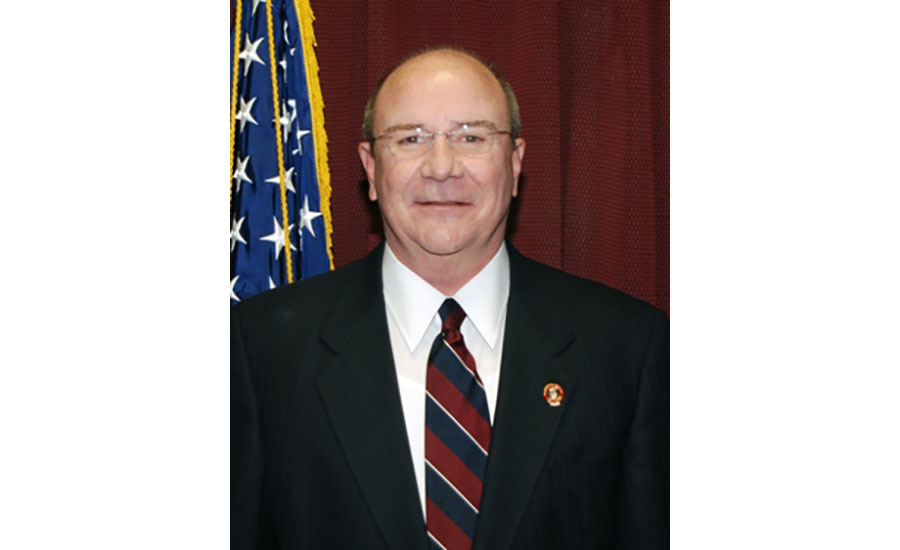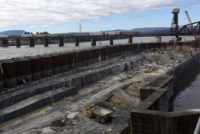President Trump has moved to fill a key federal infrastructure post, choosing to nominate long-time Mississippi River Commission member R.D. James to be assistant secretary of the Army for civil works. Waterways and port officials praised James but environmentalists worry that, if confirmed, he may harm ecosystems by trying to revive sidetracked Corps projects.
The White House on Oct. 3 announced the selection of the Missouri farmer and businessman for the position, one of the most important federal posts for the engineering and construction industry.
James declined an ENR interview request because of the upcoming confirmation process.
The assistant secretary is the political appointee who oversees the Army Corps of Engineers’ nonmilitary program, funded at about $6 billion in fiscal 2017, which includes building and maintaining flood-control infrastructure, river locks and dams, port dredging and environmental restoration projects.
James, who has a civil-engineering degree from the University of Kentucky, is a farmer and also a manager of a New Madrid, Mo., cotton gin and grain elevator company.
Jim Walker, American Association of Port Authorities director of navigation policy and legislation, says, “We’re pleased to see someone that’s nominated that’s got extensive navigation experience,” in coastal and inland waterways.
Amy Larson, president of the National Waterways Conference, says, “He will bring a great deal of leadership and experience to the ASA-CW position.”
Corps-watchers point to James’ 36-year tenure on the Mississippi River Commission as a particularly strong credential for the Army civil works job.
The panel, established in 1879, has seven members—three Corps officers, one National Oceanic and Atmospheric Administration official, and three private-sector members, two of whom are required to be civil engineers.
The commission “provides water resources engineering direction and policy advice to the administration, Congress and the Army” for the huge Mississippi River basin, according to its website.
Larson says, “Given his long history with the Mississippi River Commission, he has a wealth of knowledge on water resources issues, particularly navigation and flood control.”
John Doyle, special counsel with law and lobbying firm Jones Walker LLP, says that James’s commission experience “will equip him as well as just about anything I can think of, for somebody coming into that job to have a sense of major issues and the various parts of the Corps civil works program and the personnel and the interests who are affected by it.”
Robert Dawson, president of Dawson & Associates, a Washington, D.C., consulting firm specializing in water resources and environmental issues, says he has known James since the late 1970s. Dawson, himself a former assistant Army secretary for civil works, welcomed James's appointment and says, “I’m confident he’ll be approved by the Senate and assume that office, hopefully soon.”
If Dawson’s predictions are accurate, James could begin his new job in time for Trump to unveil his promised $1-trillion, 10-year infrastructure investment proposal. If so, says AAPA’s Walker, a former Corps civil works official, “We’re looking forward to him getting in place to be able to be a voice for maritime infrastructure in any infrastructure investment legislation that develops.”
Environmentalists' views
But Olivia Dorothy, American Rivers' associate director for the Upper Mississippi Basin, says, "We have a lot of concerns about what he might do...in terms of trying to reverse decisions that have been made by previous administrations that would put ecosystems and environmental resources in jeopardy.
In particular, Dorothy points to an unapproved New Madrid levee project near land that James reportedly owns, and a pumping station project project in west-central Mississippi. In 2008, the Environmental Protection Agency that has blocked the Yazoo Area Backwater Pumps project, issuing a decision prohibiting putting dredged or fill material in nearby wetlands and other waterways.
If James is approved, another challenge he would face is the perennial Washington tussle over funding for Corps civil works. Overall federal discretionary spending remains under pressure but Corps infrastructure needs— and its volume of authorized but unfunded projects—are much larger than its annual appropriations.
Dawson says, “The budget will always be an issue…finding enough federal dollars to match up with nonfederal dollars to get the infrastructure demands of the country met.”
Moreover, as recent hurricanes have shown, there also will be Corps-related funding needs for rebuilding after natural disasters, he notes.
On the regulatory front, James, if confirmed, could get involved with the Trump administration’s controversial plan to rescind and rewrite a 2015 Obama administration rule that aimed to clarify the scope of federal jurisdiction over construction in and around streams, wetlands and other bodies of water.
The Trump administration contends the Obama "Waters of the United States" regulation overreached. Environmental groups strongly disagree.
Story updated on 10/11/17 with comments from American Rivers and James' declining ENR interview request.




